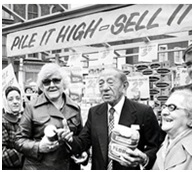|
 |
|
 |
|
|
||
Tesco - Business Success, Leadership and Motivation
Tesco
Introduction Tesco is one of the world’s biggest supermarket chains. In 2014 it had over:
After its huge success in the 1990's and 2000's (with its market share peaking at 31.8% in
2007), Tesco has had big problems since 2012 caused by:
In 2013 the consumer organization, Which?, voted Tesco Britain's worst supermarket and in 2014 chief executive, Philip Clarke, and the chairman, Richard Broadbent (pictured right above), were sacked. Since then an overstatement of profits by £263 million in the first half of 2014 has sent the company into turmoil. The reasons for its decline will be discussed later, but first we shall see how Tesco became Britain's biggest supermarket with a 28.8% market share in September 2014. Its competitors are: Asda (17.4%). Sainsbury's (16.2%). Morrisons (10.9%). Co-operative (6.4%). Waitrose (5.1%). Aldi (4.8%). Lidl (3.5%).
Key events
1919 Jack Cohen founds Tesco by opening a market stall in the East End of London (pictured right in 1978).
1924 The first own brand product sold – Tesco tea, using the initials of the:
1929 The first store opens in Burnt Oak, Edgware in North London.
1956 Tesco’s first self-service supermarket in Maldon, Essex (north east of London).
1977 Launch of ‘Checkout at Tesco’ price cutting campaign.
1985 Launch of ‘Healthy Eating’ initiative – Britain’s first supermarket to indicate the nutritional value of its own brand products.
1992 Launch of its slogan ‘Every Little Helps’
1995 Its loyalty card, the Tesco Clubcard, is launched.
2006 The Internet shopping service, Tesco Direct, is launched.
2007 Tesco opens its Fresh & Easy stores in America.
2013 Tesco is discovered selling horse meat and sells its loss making American stores Fresh & Easy.
Key people
Jack Cohen Founder who died in 1979. Chief executive 1997- 2011 (pictured right).
Ian MacLaurin Chairman 1985-97. Dave Lewis Chief executive since 2014 (pictured right).
Key quotes We can't expect our people to be happy or to make our customers happy if we don't look after them, - Tesco’s Annual Report and Accounts 2011 .
Pile it high and sell it cheap - Jack Cohen, Tesco's founder (his business motto).
YCDBSOYA: 'You can't do business sitting on your arse, - Jack Cohen.
Never stop listening to customers and giving them what they want, - Terry Leahy, chief executive 1997- 2011. The most important thing is to distinguish between a company that is simply large, and one that is excellent, - Ian MacLaurin, chairman 1985-97 (pictured right)
Why has Tesco declined?
1. Customer dissatisfaction Tesco's huge success in the 1990's and 2000's was based on:
These new products were particularly successful:
But in recent years its customers have become increasingly dissatisfied - why?
a) complacency (as the top supermarket Tesco became arrogant, lost its customer focus and stopped innovating and investing in its stores and customer service)
b) high prices (particularly in relation to the German supermarkets Aldi and Lidl)
c) quality and supply problems (particularly horse meat found in its spaghetti bolognese and burgers in 2013).
d) inconsistency of performance between stores
e) the declining popularity of its big superstores (caused by changing shopping habits including online buying)
2. Bad image People think Tesco is 'big and bad' because of its:
3. Competition
The performance of its old rival, Sainsbury's, was transformed under its chief executive, Justin King (pictured right) . Amazon has also entered the online grocery business in America and is very likely to become a competitor for Tesco in Britain.
4. Poor leadership Chief executive, Philip Clarke (pictured right), was sacked in 2014 because of his failure to:
Clarke was too autocratic, aggressive and ruthless (sacking talented top managers like his deputy, Tim Mason, pictured right).
5. Overseas problems Tesco sold it businesses in Japan in 2012 and America in 2013. Americans didn't like its Fresh & Easy stores because of their
Tesco also faces problems in its traditionally strong overseas businesses - central Europe, Asia and Ireland.
6. Employee relations Tesco has worked successfully with the British retail union, USDAW, but overseas it has been anti-union, jeopardizing employee motivation and co-operation. Tesco has also annoyed its employees with:
In 2014 its executive directors received over £1 million p.a. when the annual average wage for all employees was £12,037.
7. Suppliers
Tesco could increase co-operation and trust with its suppliers, ensuring better quality at lower prices.
Tesco is a brutal negotiator with suppliers, demanding payments to buy their goods and get the best position in the store. |
|
|
||
|
|
||
| Copyright © wisdomtowin.com 2025 All Rights Reserved | ||
|











